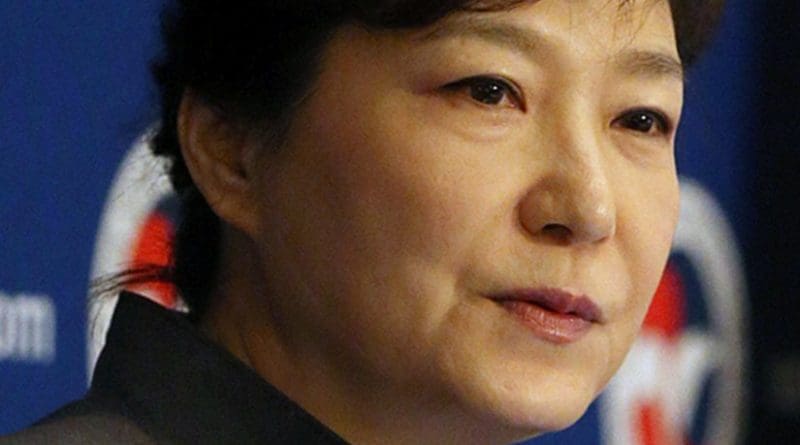China-South Korea Ties: Implications For US Pivot To Asia – Analysis
By IPCS
By Sandip Kumar Mishra*
A Victory Day Parade in Beijing was organised on 3 September 2015 to commemorate the 70th anniversary of the end of World War II, in which one of the most important spectacles was the top leaders of China, Russia and South Korea waving together at the crowds. This is the third occasion in the past three years when the Chinese President Xi Jinping and the South Korean President Park Geun-hye have met with each other, apart from a few other meetings in third countries. The participation of the top leader of South Korea in the parade is undoubtedly an important shift in East Asian inter-State relations. South Korea, which is one of the closest allies of the US in the region, appears to be moving closer to China, when another ally, Japan, is in loggerheads with Beijing. It would be incorrect to infer at this point that South Korea has drifted away from the US alliance but it does indicate that the coordination among the US, Japan and South Korea in regional politics is not the same as it was earlier.
The changing South Korean approach towards China was also quite obvious when Seoul decided to be one of the founder members of the Asia Infrastructure Investment Bank (AIIB), even at the cost of some displeasure from the US. At one point of time, the US wanted South Korea to join their Terminal High Altitude Area Defense (THAAD) project and hold itself back from joining the AIIB. Then, the US indicated that if South Korea joined both as a balancing act, Washington would not have any problem. However, at present, South Korea has joined AIIB and its decision to join THAAD is pending. China has serious reservations about South Korea joining the THAAD. Geun-hye’s participation in the Victory Parade could be read in the context of these recent developments and it definitely indicates a shift in the South Korean approach towards China.
There could be three main explanations for this shift. First, South Korean business and economic interests in China are very substantial and are growing. China is South Korea’s number one trading partner and their bilateral trade is more than South Korea’s combined bilateral trade with the US and Japan. More importantly, South Korea enjoys sufficient benefits in trading with China, which is very rare. Even though there has been a slowdown in the Chinese economy, it is very important for South Korea to maintain the best possible political relations with China to harness more benefits.
The second reason for South Korea’s growing proximity to China is related to North Korea. It could be said that China enjoys the highest leverage over North Korea. Chinese assistance to South Korea in dealing with North Korea has been and would be the most critical strategic asset and South Korea by moving closer to China has been trying to articulate this possibility. There are definite sign that North Korea is getting increasingly upset with the South Korea’s growing closeness with China and Seoul would like to pursue this line of actions to further isolate North Korea.
The third reason has to do with the growing Japanese assertiveness and the US unwillingness to cease Shinzo Abe’s provocative gestures. South Korea has not been happy with Japan’s approach on the issues of history, comfort women, visit to the Yasukuni shrine, attempt to change the peace constitution, and repeated claims over Dokdo islands. However, the US has remained either silent or indirectly supported Japan on many of these issues. Perhaps, by becoming closer to China, South Korea wants to send a message to Washington that its silence on Japan’s behaviour and bias towards Tokyo must be reviewed and changed.
From China’s point of view, having South Korea in most of its regional initiatives means that it has gradually started to strip the US from its allies in the region and emerged as a more acceptable leader in regional politics. It also means that in China’s contest with Japan, Tokyo may not have support from Seoul in the wake any crisis. It might also mean that China would have less smooth relations with North Korea in future. Improved Beijing-Seoul relations would have far-reaching consequences for China’s acceptance as the key player in the region, replacing the US.
Thus, Park Geun-hye’s participation in the Victory Parade and the growing ties between South Korea and China mark an important shift in regional politics. Although many scholars would caution against reading too much into one incident, a study of inter-State East Asian relations in recent years shows this to be just one of many such developments. There is a clear trend that is gradually but definitely emerging in East Asia and it is impossible not to connect the dots. However, it is another matter whether this shift has reached a critical point from where it would become irreversible.
* Sandip Kumar Mishra
Assistant Professor, Department of East Asian Studies, Delhi University

